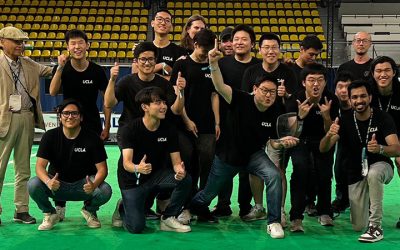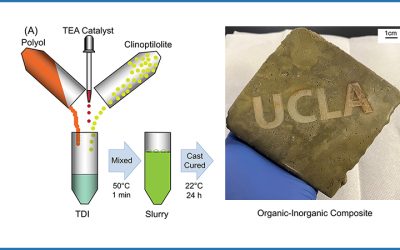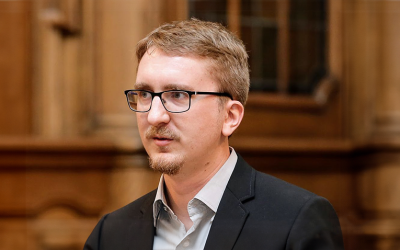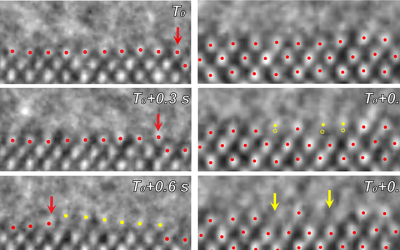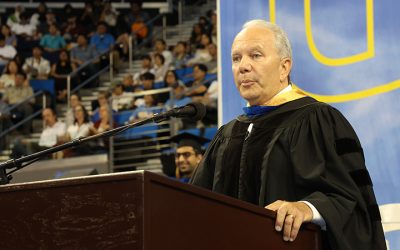
Research Centers & Institutes
A proud partner of numerous research centers and institutes.
MAJOR EXTERNALLY FUNDED MULTI-DISCIPLINARY RESEARCH CENTERS

Break Through Tech AI
The Break Through Tech AI Program helps students gain the skills they need to get jobs in the fastest-growing areas of tech: data science, machine learning and artificial intelligence. Developed by industry and academic leaders, students begin with a summer ML Engineering curriculum that teaches the critical, practical skills that help qualify candidates for entry-level jobs in the field including skills in building data analysis pipelines, training and validating ML models, while gaining experience with common ML/AI libraries.

Center for Domain Specific Computing (CDSC)
Funded by the National Science Foundation’s Expeditions in Computing program, CDSC is developing high-performance, energy efficient, customizable computing that could revolutionize the way computers are used in healthcare and other important applications.

Center for Encrypted Functionalities (CEF)
The Center for Encrypted Functionalities tackles the deep and far-reaching problem of general-purpose program obfuscation — which aims to make an arbitrary computer program “unintelligible” while preserving its functionality. CEF is supported through a National Science Foundation Secure and Trustworthy Cyberspace FRONTIER Award.

Center of Excellence for Green Nanotechnologies (CEGN)
The Center of Excellence for Green Nanotechnologies (CEGN) undertakes frontier research and development in the areas of nanotechnology in energy and nanoelectronics. It is funded through the Joint Centers of Excellence Program (JCEP) at King Abdualaziz City for Science and Technology (KACST).
Center of Excellence on New Mobility and Automated Vehicles at UCLA
Funded by the Federal Highway Administration — an agency within the U.S. Department of Transportation — with a five-year, $7.5 million grant, the Mobility Center of Excellence was launched November 2023. The multi-institutional hub will conduct research on the impacts of new mobility technologies and highly automated vehicles on the evolving transportation system when deployed at scale.
![]()
Center for Translational Applications of Nanoscale Multiferroic Systems (TANMS)
A National Science Foundation Engineering Research Center (ERC), TANMS is working to engineer a revolution in miniature electromagnetic systems through the development of a new class of nanoscale multiferroic materials.
![]()
The B. John Garrick Institute for the Risk Sciences
The Garrick Institute for the Risk Sciences is structured to be the umbrella organization of research centers in the University of California, Los Angeles to address domain-specific research and development needs.

Institute for Carbon Management
ICM is an interdisciplinary research center that focuses on engineering solutions that could be applied toward decarbonizing heavy industry.
![]()
Institute for Technology and Advancement
Here, we help transition innovative research from UCLA into the commercial sphere. We host startup competitions to promote entrepreneurship across campus and an NSF I-Corps node to help prospective startups learn customer discovery techniques and reduce the risk of commercialization.
![]()
Institute for Technology, Law & Policy
To explore how new technology affects society, privacy, government and public policy, the UCLA Samueli School of Engineering and UCLA School of Law launched the UCLA Institute for Technology, Law and Policy. The cross-disciplinary institute examines advances in artificial intelligence, autonomous vehicles, robotics and new forms of digital media to identify the benefits and risks they represent.

Named Data Networking (NDN)
The Named Data Networking (NDN) project aims to accommodate emerging patterns of communication by developing a new Internet architecture that can capitalize on strengths — and address weaknesses — of the Internet’s current host-based, point-to-point communication architecture. The NDN project is funded by the National Science Foundation under its Future Internet Architecture Program.
![]()
Science Hub for Humanity and Artificial Intelligence
Amazon and UCLA have collaborated to establish the Science Hub for Humanity and Artificial Intelligence, marking the technology company’s first such alliance with a public university. Based at the UCLA Samueli School of Engineering, the research hub will aim to leverage the cross-pollination of industry and academic research on artificial intelligence to address society’s most pressing challenges and develop solutions that will ultimately benefit humanity. The collaboration will support doctoral fellowships, research projects and community outreach programs.
![]()
Smart Grid Energy Research Center (SMERC)
The UCLA Smart Grid Energy Research Center, or SMERC, is working on wireless communications and sense-and-control to enable the Smart Electric Grid of the future. By optimizing the integration of renewable energy sources and electric vehicles, a Smart Grid offers greater efficiency, flexible electricity pricing, and increased consumer participation. Additional SMERC projects include Automated Demand Response, Electric Vehicle Integration (G2V and V2G), Microgrids, Distributed Renewable Integration, Storage Integration, Cybersecurity, and Consumer Behavior.

The Smart Manufacturing Company
In partnership with the U.S. Department of Energy, the Clean Energy Smart Manufacturing Innovation Institute (CESMII) is a non-profit that brings over $140 million in public-private investment to radically improve the precision, performance and efficiency of U.S. advanced manufacturing. CESMII is the 9th Institute of the Manufacturing USA, established by the White House to spur U.S. innovation, sustainability and competitiveness.
INTERNAL RESEARCH CENTERS
These centers emphasize research that is multi-disciplinary in nature. They allow faculty from different departments, disciplines and even universities to work together on some of society’s most critical issues.

Center for Information and Computation Security (CICS)
CICS promotes all aspects of research and education in cryptography and computer security.
![]()
Center for Research in Engineering, Media, and Performance (REMAP)
REMAP is a joint effort between UCLA Samueli and the UCLA School of Theater, Film and Television. Its mission is to explore new enriching cultural forms and empower social situations through the thoughtful interweaving of engineering, the arts and community development.

UCLA Center for Heterogeneous Integration and Performance Scaling (UCLA CHIPS)
The center was established in 2015, at the Samueli School of Engineering, to address the dramatic changes taking place in the electronic hardware arena. The immense cost of semiconductor development and manufacturing, together with the saturation in cost-power-performance metrics, has led to a consolidation of semiconductor fabrication into mega foundries. Even more far-reaching is a similar consolidation in the chip-design area. Computing paradigms are evolving as systems become more data centric and heterogeneous. This calls for a fundamental re-thinking of IC and system design and manufacture.

Scalable Analytics Institute (ScAi)
The goal of ScAi is to promote the development of new computer systems and algorithms for big data management and mining, and to foster the deployment and utilization of these systems and algorithms in big-data science projects.
PREVIOUS CENTERS
Center for Materials Research in Art and Archaeology (CMRAA)
CMRAA studied material culture across space and time, based on integrated multidisciplinary research and education combining science, archaeology, conservation and forensics. It’s a collaborative effort at UCLA between the Henry Samueli School of Engineering and Applied Science and the Cotsen Institute of Archaeology.
Center for Cell Control (CCC)
CCC focused on a new approach to engineering systems that could be applied toward the regulation of cellular functions, such as cancer eradication, stem cell differentiation, and controlling the onset of viral infections. The center was a National Institutes of Health Nanomedicine Development Center.
Center for Embedded Networked Sensing (CENS)
Funded by the National Science Foundation, CENS focused on developing wireless sensing systems and applying this revolutionary technology to critical scientific and societal pursuits. Embedded Network Sensing (ENS) systems are massively distributed collections of smart sensors and actuators embedded in the physical world.
Center for Energy Science and Technology Advanced Research (CESTAR)
CESTAR is an interdepartmental research center whose mission is to provide a common focal point for collaboration and synergy among researchers at UCLA involved in energy-related research.
Center for Quantum Science and Engineering (CQSE)
The Center for Quantum Science and Engineering (CQSE) was recently established by the Samueli School of Engineering and the Division of Physical Sciences at UCLA to coordinate research and teaching activities in the emerging field of quantum information science and technology. CQSE is also developing new approaches to education in this emerging discipline.
Functional Engineered Nano Architectronics Center (FENA)
FENA’s mission was to discover new nano-electronic materials and physical processes of devices. This enabled extendable information processing systems with enhanced functionality, while creating new applications for the semiconductor and defense industries. It was sponsored by the Semiconductor Research Corporation (SRC), a consortium of the world’s leading technology companies.
Center for Nanoscience Innovation for Defense (CNID)
CNID facilitated the rapid transition of research innovation in the nanosciences into defense sector applications. The center was sponsored by two federal agencies: the Defense Advanced Research Project Agency (DARPA) and Defense MicroElectronics Activity (DMEA).
Western Institute of Nanoelectronics (WIN)
WIN’s mission is to explore and develop advanced research devices, circuits and nanosystems with performance beyond conventional scaled CMOS. WIN was established with Nanoelectronics Research Initiative grant funded by six major semiconductor companies — Intel, IBM, Texas Instruments, AMD, Freescale and MICRON, plus an additional $12 million from Intel, and a UC Discovery Grant from the Industry-University Cooperative Research Program.
News
UCLA Engineers Become 6-Time RoboCup Soccer World Champions
UCLA engineers dominated at RoboCup 2024 July 18–21 in Eindhoven, Netherlands, with a pair of humanoid ARTEMIS robots winning every game in the soccer tournament to snag the world championship.
UCLA Researchers Create High-Strength Composites by Upcycling Polymer Foams
A team of researchers led by UCLA chemical engineers has discovered a way to make tough and durable composite materials with strength comparable to that of cement, by recycling a common polymer foam found in sofas and mattresses.
UCLA Computer Scientist Receives $2.8M DARPA Grant to Demonstrate New AI Model
Guy Van den Broeck, a professor of computer science at the UCLA Samueli School of Engineering, has received a three-year, $2.8 million research grant from the Defense Advanced Research Projects Agency (DARPA) to lead
UCLA Researchers Part of National Science Foundation Project to Decarbonize Infrastructure
A pair of UCLA researchers are part of a five-year, $12 million research program funded by the National Science Foundation to decarbonize the full life cycles of infrastructure by optimizing and automating carbon efficiency across multiple sectors.
Atomic View of a Chemical Catalyst During Electrically Charged Reaction is a Scientific First
All around us are products that depend on chemical reactions aided by electricity. These electrochemical reactions are involved in manufacturing everything from aluminum and PVC pipe to soap and paper.
Walt Disney Imagineer and UCLA Alumnus Craig Russell Headlines Undergraduate Commencement
Former Disney Imagineer and UCLA Samueli School of Engineering alumnus Craig Russell ’80 delivered the keynote remarks at the UCLA Samueli undergraduate commencement ceremony Saturday, June 15.

